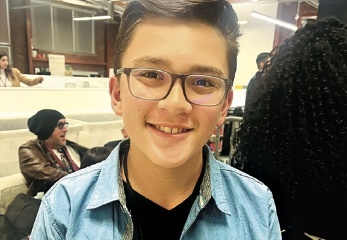By Ethan Dumper
KidScoop Media Correspondent
Age 13
On Monday, April 17, Vice President Kamala Harris toured the Los Angeles Cleantech Incubator, where she heard presentations from entrepreneurs in the cleantech sector and spoke about the importance of affordable clean energy.
The Los Angeles Cleantech Incubator, or LACI, is an organization that is working to “create an inclusive green economy for Greater Los Angeles and beyond,” by “unlocking innovation, market transformation, and enhancing community.” LACI invests in businesses in the green economy sector and helps them grow their organization. They have invested over $1 billion in funding for their partners, and make sure to put focus on historically underrepresented entrepreneurs.
Sabrina Williams is the CEO & Founder of SEED, which is centered around a product that measures the carbon levels of soil. Farmers can stick the device, which is no longer than 20 inches, into the ground and it will give them a carbon reading of their soil. “We are measuring soil carbon to help people understand how much carbon they have in their soil and how much they are keeping
out of the atmosphere, because the more carbon you have in your soil, the healthier your plants are, and you’re going to increase your yields,” explained Williams. Not only is the product supporting the environment, but it can also be used to support farmers in developing communities. To put it simply, SEED is “Helping democratize access to agriculture technology.”
LACI has three main goals and categories for its work: Unlocking innovation, market transformation, and enhancing community. The funding and support that SEED has received falls under unlocking innovation and Vice President Harris discussed how we can scale this to a national level in her speech. “We are very proud that through the Inflation Reduction Act combined with the bipartisan infrastructure law and the CHIPS act, we have calculated that we are investing about $1 trillion in the next ten years in clean energy,” she said. She later referred to a green energy economy as “where it [the future of the economy] is all going.”
Another topic of the afternoon was ensuring that access to green energy and jobs in the green energy sector is available to people from all walks of life. That is something that both LACI focuses on in their long-term goals, and Vice President Harris spoke about. “What you [LACI] are doing in terms of the incubation with the eye to the intentionality of ensuring that we are also investing in people that have not been invested in, and look at it through the lens of life experience, race, and gender… is understanding that the more people who are participating, with the diversity of life experience and perspective, the more exciting, interesting, and relevant the innovation will be.”
Kayla Mullins is a graduate of LACI’s workforce training program, where she spent 6 weeks learning how to work on certain projects in the green energy sector. Mullins talked about how for a project she got an electric charging station and learned how to take it apart and put it back together. After that, she saw more and more charging stations across Los Angeles and now has a paid internship at a LACI startup. “I got a bigger idea of how important it is to have electric vehicles on the road, which is something I never really thought about,” said Mullins in a presentation with the Vice President. “Where I am from, South Central, you do not see a lot of that [Electric Vehicles]. During and after the course I started seeing more of that and it became more of an interest for me,” Mullins continued.
Vice President Harris also brought up the idea of not defining jobs by just one title, and limiting ourselves in who can work in that job because of any past experience they have. She brought up this point during the presentation, and in her speech. “I would challenge us to not just think of a title. I would challenge us to not just think of a degree, but to define and advertise the job based on the skill that the job requires.” She mentioned it yet again later while describing the responsibilities of someone who we traditionally called a mechanic. “We would have all traditionally called that person a mechanic, but now we are calling the person that is doing the EV stuff a technician. It’s the same skill!” The reason she kept bringing it up, is because although people who know how to do the work and have been doing the work for a while, they are not being hired for the positions that they are qualified for because they call themselves something different. “We got some fancy new titles but we are talking about folks who have the skills who have been doing the work for skills and generations, and their skills transfer into this new economy.”
The overall message from the presenters, LACI, and the vice president is that the future of the energy economy is in clean tech and green energy because otherwise, we will not have a planet to call home. “History is going to show, that this was a pivotal moment,” Vice President Harris finished.













